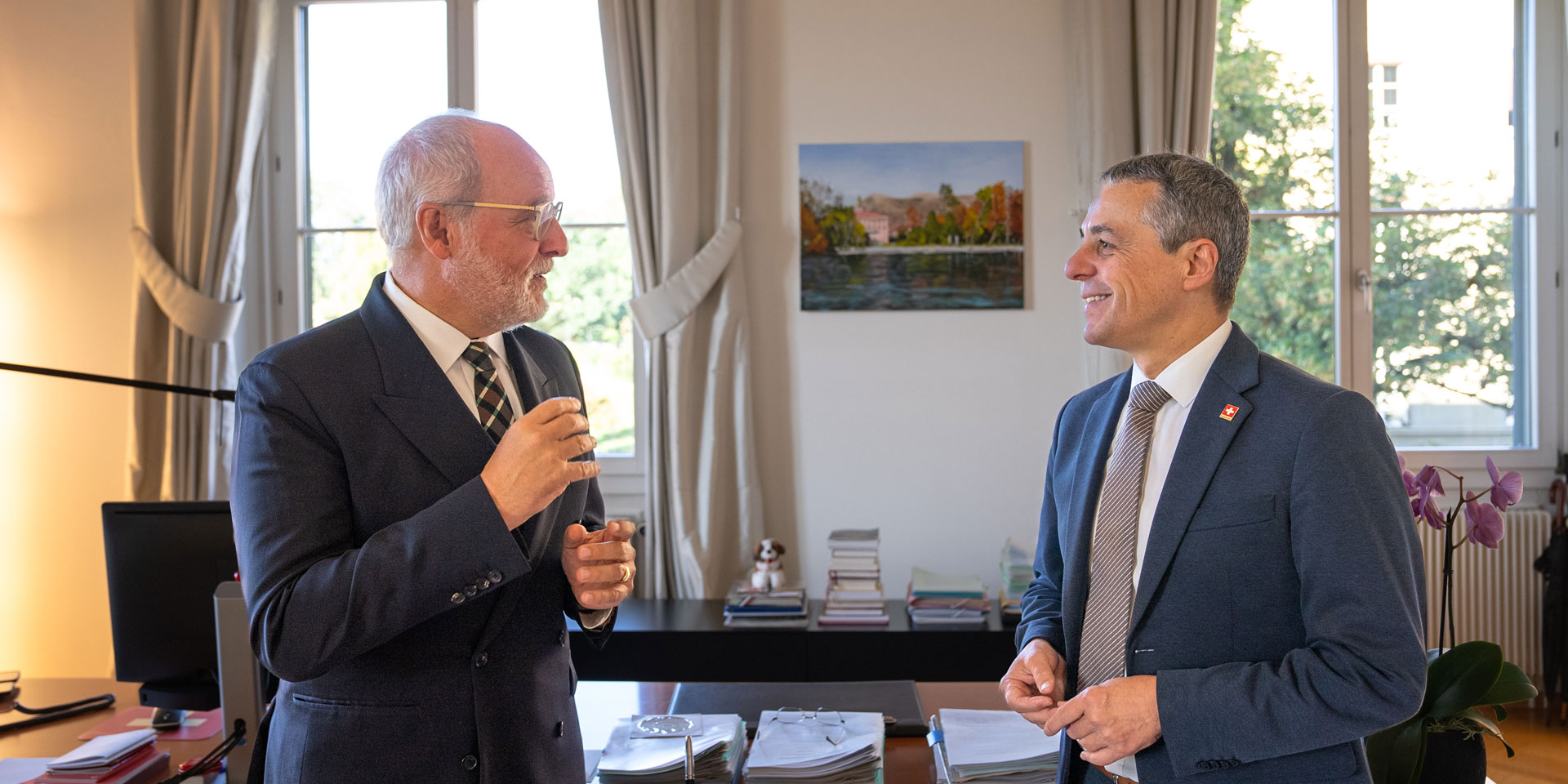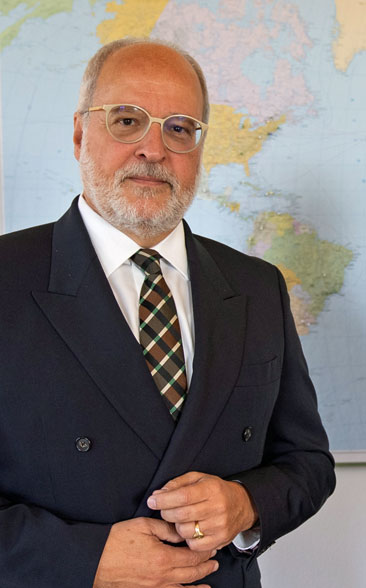"As State Secretary, I'm in a central position to help shape our future."
Canberra, London, Geneva, and now back in Bern: Alexandre Fasel brings experience from postings around the world to his new job as head of the FDFA State Secretariat – and can even draw on a previous role in Formula 1 as a "source of inspiration for diplomacy in times of great uncertainty".

First visit to the head of the department: Federal Councillor Ignazio Cassis receives Alexandre Fasel in his new function as FDFA State Secretary. © FDFA

As State Secretary of the FDFA, you are the FDFA's highest-ranking diplomat. What are your duties in this role?
First of all, I personally am passionate about my country, its political culture, the political system – and of course its future. As State Secretary, I'm in a central position to help shape this future.
What exactly can you do as the head of the FDFA State Secretariat?
The State Secretariat is responsible for implementing Switzerland's Foreign Policy Strategy. The strategy is adopted by the Federal Council for a four-year period, so we can ensure that our foreign policy priorities and thematic focus always reflect developments in the wider world. That gives us an optimal basis for safeguarding Switzerland's interests around the world and promoting the values that are important to us. It allows us to work for peace and security, respect for human rights, the eradication of poverty, sustainable economic growth and universal enjoyment of the benefits of scientific progress and digital technologies.
That's why your remit as State Secretary also includes Switzerland's representations abroad?
Yes. In addition to my role in the State Secretariat, I also oversee the FDFA's external network of 170 representations around the world. For our foreign policy to have an impact and thus be successful, coordination and coherence are essential. A well-functioning network of official representations also benefits Swiss citizens, whether they are travelling or living abroad.
"Foreign policy is domestic policy" is a guiding principle for Federal Councillor Cassis. How does this apply to your role?
Foreign policy and domestic policy are indeed closely interlinked. Just think of the war in Ukraine, the effects of which have also been felt in Switzerland, or of Swiss-EU relations, or our seat on the UN Security Council. My duties as State Secretary therefore include advising the government in all foreign policy matters. I also support the head of the FDFA, Federal Councillor Ignazio Cassis, in his work with Parliament and the cantons, especially when it comes to foreign policy concerns that impact Switzerland's domestic affairs.
As a diplomat, you have worked in various capacities in different locations around the world. How do these experiences inform your role as State Secretary?
I started out in 1991, in what was then the FDFA/FDEA Integration Office, which was responsible for Switzerland's European policy. Then I worked for Federal Councillor Flavio Cotti, at the interface between domestic and foreign policy. In my posts in Canberra and as the Swiss ambassador in London, I focused on bilateral relations between Switzerland and the host countries. As the head of Policy Planning, I was responsible for analysing Switzerland's foreign affairs and formulating policy. And as the head of the UN Division and the Permanent Mission in Geneva, I gained experience in multilateral affairs, working in International Geneva. Most recently, as Switzerland's special representative for science diplomacy, I worked with the GESDA Foundation (Geneva Science and Diplomacy Anticipator), established by the Federal Council and Geneva State Council to provide a tool to enable the international community to anticipate breakthroughs in science and technology so it can take action and shape how they impact our futures. In other words, in all my previous activities I have been able to gain experiences that I will now put to use as State Secretary.
You once had a useful 'pit stop' in your diplomatic career – tell us about when you worked in Formula 1 for a main sponsor of the Sauber team. What was your role – and do you think the pit crew's well-practised tyre changes could be a model for efficient foreign policy?
F1 tyre changes, accomplished by a team of about 20 people in 2 seconds, really show how you can achieve maximum impact in a complex system! Formula 1 is a first class technology accelerator because of the fierce competition and high-levels of sponsorship. I used that experience as the ambassador in London, working with the Swiss Business Hub to accelerate collaboration between the Swiss and UK tech industries. Formula 1 is hugely competitive. Everything hangs in the balance. Nothing is a given – every team has to fight for pole position at every race. That's certainly a metaphor and a source of inspiration for diplomacy in times of great uncertainty.
